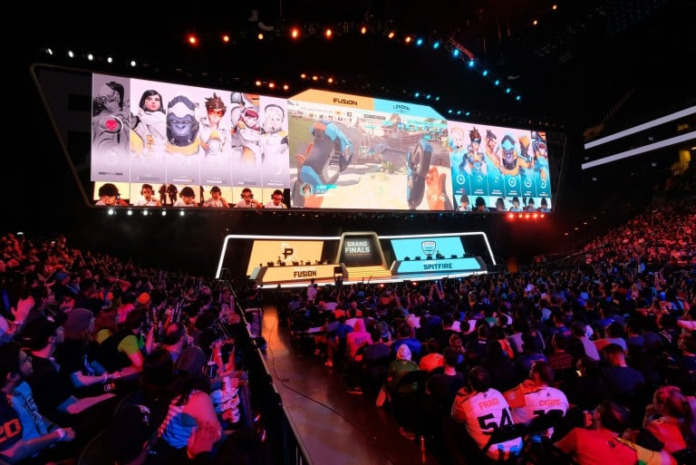After Blizzard Entertainment announced the Overwatch Champions Series, the direct replacement for the now-extinct Overwatch League, elation spread across the game’s fanbase. Promises of new beginnings and continued support for Overwatch 2’s diverse community have quickly been squelched, however, after the realization that Blizzard’s new partner in this OWCS endeavor has dubious backing.
Recommended Videos
To facilitate the OWCS, particularly in the North America and EMEA regions, Blizzard has struck up a partnership with ESL FACEIT, a company that has helped run competitive opportunities in other Blizzard titles. The biggest concern with FACEIT helping with OWCS is that the company is owned by Savvy Games Group, a company that receives funding from the government of Saudi Arabia.
The official OWCS logo. Image via Blizzard Entertainment.
As a game that based its image on embracing characters of all identities, including LGBT identities, Overwatch’s developer utilizing funding from Saudi Arabia, where being gay is against the law, is too big of a concern to ignore. Yet, with the dissolution of the Overwatch League, many community members see the new partnership as a last resort to keep competitive Overwatch alive.
“It’s fucked that esports has struggled to be profitable for so long that this is the only option,” Austin “Muma” Wilmot, the first openly-LGBT player in the Overwatch League, said after Blizzard’s initial OWCS announcement. “But you know, capitalism or whatever.”
Saudi Arabia has become increasingly invested in esports, and Overwatch in particular, in a move prominent community voices have suggested is “esportswashing.” Esportswashing, derived from the term “sportswashing,” is defined as the process of using presence and investment in esports to try to improve an entity’s negative reputation. With FACEIT’s partnership for a new tier-one Overwatch circuit comes underlying tones of Saudi Arabia capitalizing on a community desperate to get competitive support for their game back.
“Investing in esports is tough right now because esports doesn’t easily make money,” a former Overwatch Contenders caster who wished to remain anonymous said to Dot Esports. “Saudi-owned orgs have oodles of money to blow wherever they feel like, and currently, no one else really does.”
This puts the Overwatch community in a difficult position since LGBTQ symbols and members of the community that have defined the game for so long are suddenly being taken away, seemingly at the expense of having a circuit. One of the first things fans noticed about the OWCS announcement was that Tracer, Overwatch’s canonically lesbian cover girl, is no longer a part of the official tournament logo or graphics. Though it seems like one small change that may just be designed to separate the new OWCS from its predecessor in the Overwatch League, the logo change sends a particular message, however subtle.
Dot Esports reached out to Blizzard for comment on the OWCS logo not including Tracer, but received no response by the time of publishing this article.
Official graphics no longer feature Tracer. Screenshot via Blizzard Entertainment
Aside from small gestures that could remind fans the circuit wouldn’t be possible without Saudi Arabian funding, the OWCS could potentially also invite a lower tolerance for larger, explicit remarks that could put LGBTQ players and staff in danger.
“One has to imagine that eventually, the Saudi-owned org is going to want events within their country, right? That just makes sense,” the former Contenders caster said. “When it eventually does happen, how could that possibly mix well with a community so heavily ingrained with LGBTQ+ themes, and with a massive LGBTQ fanbase, and tons of LBGTQ professionals working within the OWCS and beyond?”
Other casters and tournament organizers who wished to remain anonymous spoke to Dot Esports and also expressed explicit instances of homophobia and transphobia when interacting with fans and teams from Saudi Arabia. Many concerns arose last year during the Overwatch World Cup, where Saudi Arabia’s team won first place. Knowing about these experiences has made community members question the new partnership.
“Blizzard and the Overwatch team either did nothing to protect their pride community on purpose or were unable to and I don’t want to distract the Overwatch team in parts they can’t control,” UserIntel, a socials content manager who worked with the Overwatch World Cup team representing Puerto Rico, said. “But I expect teams to get away with very phobic remarks during this upcoming season, and I plan to not express myself in any fashion to avoid targeted harassment.”
Yet, at the end of the day, the Overwatch community is still celebrating the return of competitive play. With so many players, organizers, and viewers passionate about the game and its community, some believe it’s still better for there to be a supported competitive scene than nothing at all.
Muma on stage. Photo by Robert Paul via Blizzard Entertainment
“It pains me to say it, but I do think it’s better for Overwatch to have a comp scene than not,” Muma said. “And if this is the only way, well, so be it, I guess.”Both players and competitive Overwatch viewers have to ask themselves if supporting a game that was once a pioneer of LGBTQ identities in this context is still worth it. If fans go to events in person, for example, part of that money is going to FACEIT.
Though many would argue there is no ethical consumerism in a capitalist landscape, it still hurts to see a game that once accepted everyone with open arms now have a league with hidden undertones of homophobia.




